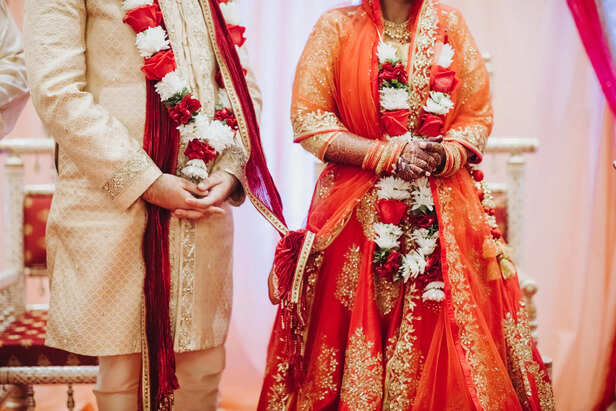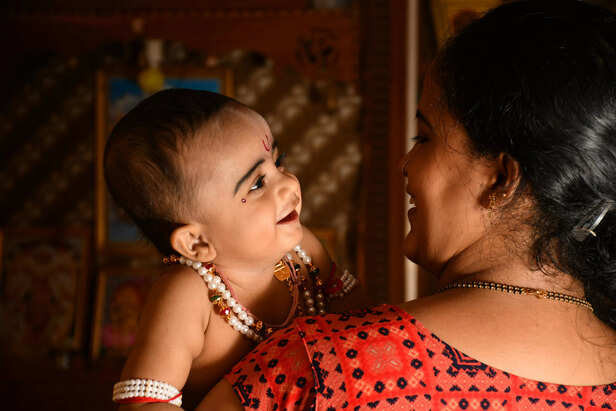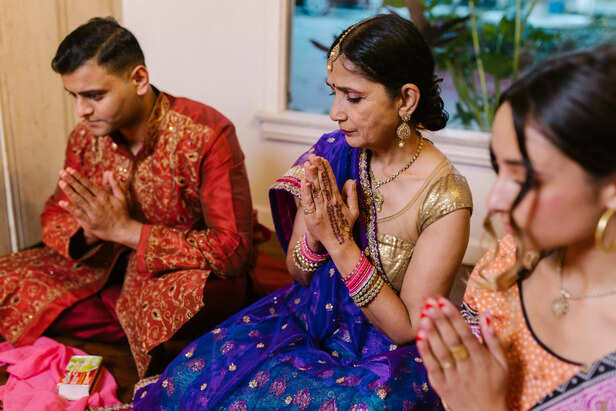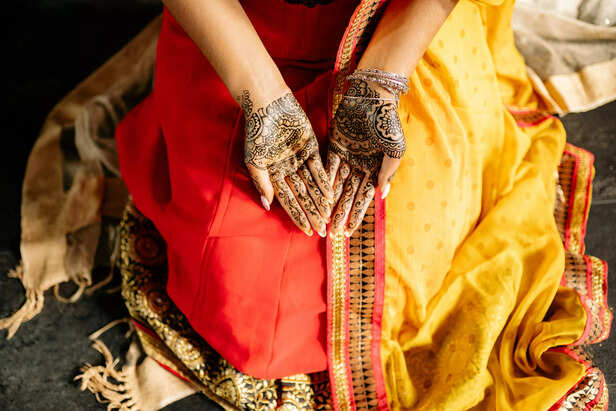‘Gharelu Aurat’ and Her ‘Joru Ka Ghulam’: How Indian Tradition Exploits Housewives
Riya Kumari | Jan 07, 2025, 13:45 IST
( Image credit : Timeslife )
Tradition has its place. Sure. But when it starts to feel like a prison sentence, maybe it’s time to rethink things. Women—whether housewives, working moms, or somewhere in between—deserve more. More respect, more appreciation, and more freedom to live their lives without being shackled by outdated expectations. And if that makes you uncomfortable, well, maybe it’s the tradition that needs fixing… not the women.
Look, I’m not saying tradition is all bad. Some parts are beautiful, like the ones that involve food and dancing. But when it comes to housewives, tradition often feels like a trap—one wrapped up in guilt, duty, and a lot of unsolicited advice. Maybe it’s time we rewrite the rules. Because, spoiler alert: women are not magical, all-sacrificing beings. They’re people. And people deserve respect, equality, and, for heaven’s sake, a nap.
1. The Burden of Modesty

The ghunghat or parda—an age-old symbol of “respect.” Respect for whom, exactly? Because it certainly doesn’t seem to be for the woman wearing it. Women are told to dress modestly to “protect” themselves, but if short clothes are the problem, why do even covered faces become a requirement? It’s almost like the issue isn’t what women wear but the fact that they exist. And if she dares to rebel? The shame comes from all sides—men and women alike. Yes, women perpetuate it too, reinforcing patriarchy because they’ve been conditioned to believe in it. It’s a system that doesn’t just oppress; it recruits. And the worst part? Nobody ever questions why a woman’s dignity is tied to how much of herself she hides.
2. The Invisible Labor

Here’s a question for you: If a woman scrubs the floors but nobody claps for her, did she even do it? The answer, apparently, is yes. Day in and day out, housewives keep their homes running like a well-oiled machine. They clean, cook, organize, garden, manage the kids, and handle the emotional labor of the entire family. But where’s the recognition? A man comes home after work, and his tiredness is a given. A woman spends her day juggling endless tasks, and all she gets are complaints. “The food is too salty.” “Why isn’t the house spotless?” Never mind the fact that her work doesn’t come with weekends off, health benefits, or even a thank-you. Let’s call it what it is: exploitation.
3. The Branding of Marriage

Marriage is supposed to be a partnership, right? Then why does it feel like women are handed a checklist of ways to prove they’re “off the market”? From changing their surnames to adopting visible markers of their new status, women are expected to transform themselves overnight into walking billboards of marital commitment. These are all symbols of a married woman, worn like a badge of honor—or, depending on your perspective, a tag of ownership. Why is her loyalty questioned as if it’s a default setting she has to prove? Meanwhile, men? They get to stroll through life looking exactly the same as they did before marriage. No one asks, “Are you married? Who do you belong to?” Their loyalty isn’t questioned because, apparently, that’s a “woman’s thing.” It’s a glaring double standard that sends a message: a woman’s identity post-marriage isn’t her own—it’s tied to her relationship status. That her devotion needs to be visible, even when his doesn’t.
4. The Parenting Trap

Motherhood, they say, is the most beautiful journey. But let’s be real—it’s also the most thankless. If a guy changes one diaper, he’s “Dad of the Year.” Really? That’s the bar? No wonder moms lose themselves post-pregnancy. She gives up sleep, her career, her hobbies, and sometimes her sanity, but the world doesn’t even blink. Doing the bare minimum is cause for celebration, while a mother’s round-the-clock efforts are dismissed as just “what she’s supposed to do.” The pressure doesn’t stop there. Women who dare to ask for time off from motherhood are branded as selfish. And God forbid she asks for a break. Then it’s all, “But you’re the mother.” But how can she care for her family if she’s falling apart? Mothers are human first, and humans need rest, support, and understanding.
5. Marriage as a Caretaking Contract

In many traditional households, a wife is expected to fix everything—from the husband's inability to cook to his parents’ old-age needs. She’s the caretaker, the nurse, the therapist, and the glue holding it all together. But let’s flip the script for a second. Why is it never the husband’s responsibility to care for his wife’s aging parents? Why are her family members treated as disposable while his are placed on a pedestal? The double standard is glaring, yet nobody talks about it. Here’s a radical idea: if a family needs a caretaker, hire one. Marriage should be a partnership, not a lifelong caregiving job forced on women.
6. The Tyranny of Timelines

“Why aren’t you married yet?” “When are you having kids?” “Why haven’t you had a second child?” The questions come like a relentless tide, drowning couples in judgment and unsolicited advice. What’s worse, the same people who badger women about their timelines are the ones clutching their pearls if a husband shows affection for his wife or dares to help her with housework. A quick hug? Scandalous. A man folding laundry? “Joru ka gulam.” It’s almost like society wants women to fulfill every traditional role while shaming men for stepping up as partners. The hypocrisy is exhausting.
1. The Burden of Modesty

Saree
( Image credit : Timeslife )
The ghunghat or parda—an age-old symbol of “respect.” Respect for whom, exactly? Because it certainly doesn’t seem to be for the woman wearing it. Women are told to dress modestly to “protect” themselves, but if short clothes are the problem, why do even covered faces become a requirement? It’s almost like the issue isn’t what women wear but the fact that they exist. And if she dares to rebel? The shame comes from all sides—men and women alike. Yes, women perpetuate it too, reinforcing patriarchy because they’ve been conditioned to believe in it. It’s a system that doesn’t just oppress; it recruits. And the worst part? Nobody ever questions why a woman’s dignity is tied to how much of herself she hides.
2. The Invisible Labor

Dough
( Image credit : Timeslife )
Here’s a question for you: If a woman scrubs the floors but nobody claps for her, did she even do it? The answer, apparently, is yes. Day in and day out, housewives keep their homes running like a well-oiled machine. They clean, cook, organize, garden, manage the kids, and handle the emotional labor of the entire family. But where’s the recognition? A man comes home after work, and his tiredness is a given. A woman spends her day juggling endless tasks, and all she gets are complaints. “The food is too salty.” “Why isn’t the house spotless?” Never mind the fact that her work doesn’t come with weekends off, health benefits, or even a thank-you. Let’s call it what it is: exploitation.
3. The Branding of Marriage

Marriage
( Image credit : Timeslife )
Marriage is supposed to be a partnership, right? Then why does it feel like women are handed a checklist of ways to prove they’re “off the market”? From changing their surnames to adopting visible markers of their new status, women are expected to transform themselves overnight into walking billboards of marital commitment. These are all symbols of a married woman, worn like a badge of honor—or, depending on your perspective, a tag of ownership. Why is her loyalty questioned as if it’s a default setting she has to prove? Meanwhile, men? They get to stroll through life looking exactly the same as they did before marriage. No one asks, “Are you married? Who do you belong to?” Their loyalty isn’t questioned because, apparently, that’s a “woman’s thing.” It’s a glaring double standard that sends a message: a woman’s identity post-marriage isn’t her own—it’s tied to her relationship status. That her devotion needs to be visible, even when his doesn’t.
4. The Parenting Trap

Mother and child
( Image credit : Timeslife )
Motherhood, they say, is the most beautiful journey. But let’s be real—it’s also the most thankless. If a guy changes one diaper, he’s “Dad of the Year.” Really? That’s the bar? No wonder moms lose themselves post-pregnancy. She gives up sleep, her career, her hobbies, and sometimes her sanity, but the world doesn’t even blink. Doing the bare minimum is cause for celebration, while a mother’s round-the-clock efforts are dismissed as just “what she’s supposed to do.” The pressure doesn’t stop there. Women who dare to ask for time off from motherhood are branded as selfish. And God forbid she asks for a break. Then it’s all, “But you’re the mother.” But how can she care for her family if she’s falling apart? Mothers are human first, and humans need rest, support, and understanding.
5. Marriage as a Caretaking Contract

Joint Family
( Image credit : Timeslife )
In many traditional households, a wife is expected to fix everything—from the husband's inability to cook to his parents’ old-age needs. She’s the caretaker, the nurse, the therapist, and the glue holding it all together. But let’s flip the script for a second. Why is it never the husband’s responsibility to care for his wife’s aging parents? Why are her family members treated as disposable while his are placed on a pedestal? The double standard is glaring, yet nobody talks about it. Here’s a radical idea: if a family needs a caretaker, hire one. Marriage should be a partnership, not a lifelong caregiving job forced on women.
6. The Tyranny of Timelines

Marriage
( Image credit : Timeslife )
“Why aren’t you married yet?” “When are you having kids?” “Why haven’t you had a second child?” The questions come like a relentless tide, drowning couples in judgment and unsolicited advice. What’s worse, the same people who badger women about their timelines are the ones clutching their pearls if a husband shows affection for his wife or dares to help her with housework. A quick hug? Scandalous. A man folding laundry? “Joru ka gulam.” It’s almost like society wants women to fulfill every traditional role while shaming men for stepping up as partners. The hypocrisy is exhausting.
